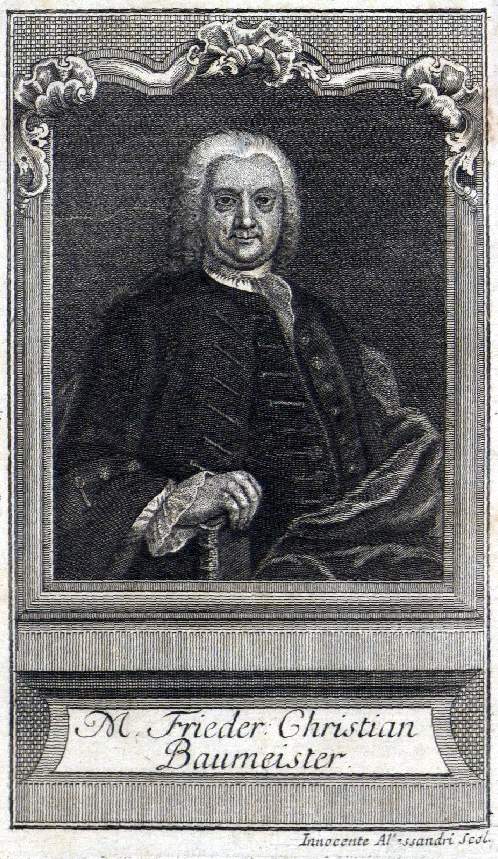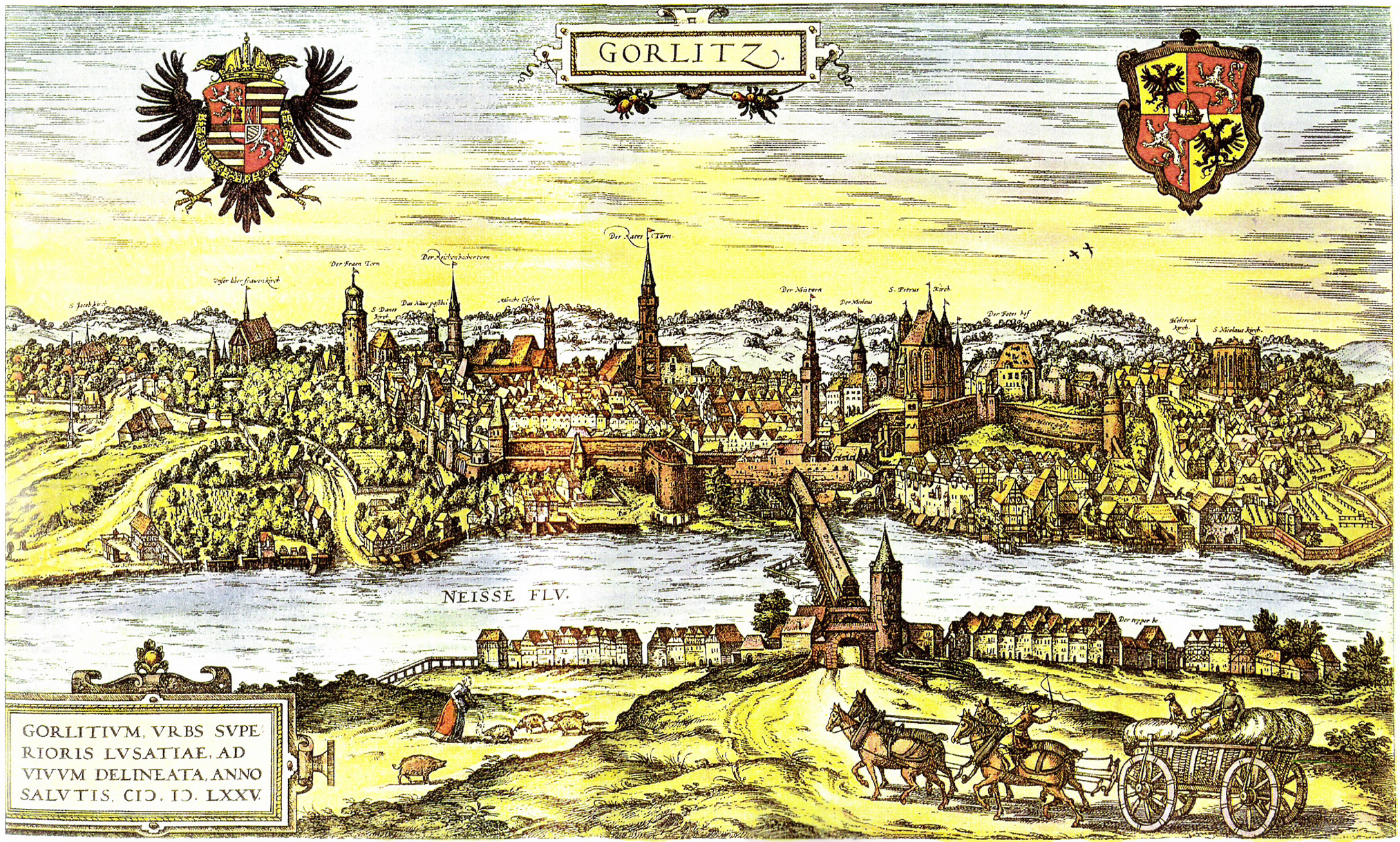|
Friedrich Christian Baumeister
Friedrich Christian Baumeister (17 July 1709 – 8 October 1785) was a German philosopher. Baumeister studied philosophy in Jena and Wittenberg. He became director of the Görlitz Görlitz (; pl, Zgorzelec, hsb, Zhorjelc, cz, Zhořelec, :de:Ostlausitzer Mundart, East Lusatian dialect: ''Gerlz'', ''Gerltz'', ''Gerltsch'') is a town in the Germany, German state of Saxony. It is located on the Lusatian Neisse River, and ... gymnasium in 1736. His textbooks propagated the metaphysics of Christian Wolff. Works * ''Philosophia definitiva'', 17351767 editionavailable online * ''Institutiones philosophiae rationalis : methodo Wolfii conscriptae'', 1735 * ''Institutiones metaphysicae : ontologiam, cosmologiam, psychologiam, theologiam denique naturalem complexae'', 1738 and 1751 * ''Historia doctrinae de mundo optimo'', 1741 * ''Elementa philosophiae recentioris : usibus iuventutis scholasticae accommodata'', 1747 References External links 1709 births 1785 deaths 18th-c ... [...More Info...] [...Related Items...] OR: [Wikipedia] [Google] [Baidu] |
Friedrich Christian Baumeister
Friedrich Christian Baumeister (17 July 1709 – 8 October 1785) was a German philosopher. Baumeister studied philosophy in Jena and Wittenberg. He became director of the Görlitz Görlitz (; pl, Zgorzelec, hsb, Zhorjelc, cz, Zhořelec, :de:Ostlausitzer Mundart, East Lusatian dialect: ''Gerlz'', ''Gerltz'', ''Gerltsch'') is a town in the Germany, German state of Saxony. It is located on the Lusatian Neisse River, and ... gymnasium in 1736. His textbooks propagated the metaphysics of Christian Wolff. Works * ''Philosophia definitiva'', 17351767 editionavailable online * ''Institutiones philosophiae rationalis : methodo Wolfii conscriptae'', 1735 * ''Institutiones metaphysicae : ontologiam, cosmologiam, psychologiam, theologiam denique naturalem complexae'', 1738 and 1751 * ''Historia doctrinae de mundo optimo'', 1741 * ''Elementa philosophiae recentioris : usibus iuventutis scholasticae accommodata'', 1747 References External links 1709 births 1785 deaths 18th-c ... [...More Info...] [...Related Items...] OR: [Wikipedia] [Google] [Baidu] |
Jena
Jena () is a German city and the second largest city in Thuringia. Together with the nearby cities of Erfurt and Weimar, it forms the central metropolitan area of Thuringia with approximately 500,000 inhabitants, while the city itself has a population of about 110,000. Jena is a centre of education and research; the Friedrich Schiller University was founded in 1558 and had 18,000 students in 2017 and the Ernst-Abbe-Fachhochschule Jena counts another 5,000 students. Furthermore, there are many institutes of the leading German research societies. Jena was first mentioned in 1182 and stayed a small town until the 19th century, when industry developed. For most of the 20th century, Jena was a world centre of the optical industry around companies such as Carl Zeiss, Schott and Jenoptik (since 1990). As one of only a few medium-sized cities in Germany, it has some high-rise buildings in the city centre, such as the JenTower. These also have their origin in the former Carl Zeiss factor ... [...More Info...] [...Related Items...] OR: [Wikipedia] [Google] [Baidu] |
Wittenberg
Wittenberg ( , ; Low Saxon language, Low Saxon: ''Wittenbarg''; meaning ''White Mountain''; officially Lutherstadt Wittenberg (''Luther City Wittenberg'')), is the fourth largest town in Saxony-Anhalt, Germany. Wittenberg is situated on the River Elbe, north of Leipzig and south-west of Berlin, and has a population of 46,008 (2018). Wittenberg is famous for its close connection with Martin Luther and the Protestant Reformation, for which it received the honourific ''Lutherstadt''. Several of Wittenberg's buildings are associated with the events, including a preserved part of the Augustinians, Augustinian monastery in which Luther lived, first as a monk and later as owner with his wife Katharina von Bora and family, considered to be the world's premier museum dedicated to Luther. Wittenberg was also the seat of the Elector of Saxony, a dignity held by the dukes of Duchy of Saxe-Wittenberg, Saxe-Wittenberg, making it one of the most powerful cities in the Holy Roman Empire. To ... [...More Info...] [...Related Items...] OR: [Wikipedia] [Google] [Baidu] |
Görlitz
Görlitz (; pl, Zgorzelec, hsb, Zhorjelc, cz, Zhořelec, :de:Ostlausitzer Mundart, East Lusatian dialect: ''Gerlz'', ''Gerltz'', ''Gerltsch'') is a town in the Germany, German state of Saxony. It is located on the Lusatian Neisse River, and is the largest town in Upper Lusatia as well as the second-largest town in the region of Lusatia, after Cottbus. Görlitz is the easternmost town in Germany (easternmost village is Zentendorf, Zentendorf (Šćeńc)), and lies opposite the Poland, Polish town of Zgorzelec, which was the eastern part of Görlitz until 1945. The town has approximately 56,000 inhabitants, which make Görlitz the List of cities in Saxony by population, sixth-largest town in Saxony. It is the seat of the Görlitz (district), district of Görlitz. Together with Zgorzelec, it forms the Euro City of Görlitz/Zgorzelec, which has a combined population of around 86,000. While not Sorbian languages, Lusatiophone itself, the town is situated just east of the Sorbian la ... [...More Info...] [...Related Items...] OR: [Wikipedia] [Google] [Baidu] |
Christian Wolff (philosopher)
Christian Wolff (less correctly Wolf, ; also known as Wolfius; ennobled as Christian Freiherr von Wolff in 1745; 24 January 1679 – 9 April 1754) was a German philosopher. Wolff is characterized as the most eminent German philosopher between Leibniz and Kant. His life work spanned almost every scholarly subject of his time, displayed and unfolded according to his demonstrative-deductive, mathematical method, which perhaps represents the peak of Enlightenment rationality in Germany. Following Gottfried Wilhelm Leibniz, Wolff also wrote in German as his primary language of scholarly instruction and research, although he did translate his works into Latin for his transnational European audience. A founding father of, among other fields, economics and public administration as academic disciplines, he concentrated especially in these fields, giving advice on practical matters to people in government, and stressing the professional nature of university education. Life Wolff was b ... [...More Info...] [...Related Items...] OR: [Wikipedia] [Google] [Baidu] |
1709 Births
Seventeen or 17 may refer to: *17 (number), the natural number following 16 and preceding 18 * one of the years 17 BC, AD 17, 1917, 2017 Literature Magazines * ''Seventeen'' (American magazine), an American magazine * ''Seventeen'' (Japanese magazine), a Japanese magazine Novels * ''Seventeen'' (Tarkington novel), a 1916 novel by Booth Tarkington *''Seventeen'' (''Sebuntiin''), a 1961 novel by Kenzaburō Ōe * ''Seventeen'' (Serafin novel), a 2004 novel by Shan Serafin Stage and screen Film * ''Seventeen'' (1916 film), an American silent comedy film *''Number Seventeen'', a 1932 film directed by Alfred Hitchcock * ''Seventeen'' (1940 film), an American comedy film *''Eric Soya's '17''' (Danish: ''Sytten''), a 1965 Danish comedy film * ''Seventeen'' (1985 film), a documentary film * ''17 Again'' (film), a 2009 film whose working title was ''17'' * ''Seventeen'' (2019 film), a Spanish drama film Television * ''Seventeen'' (TV drama), a 1994 UK dramatic short starring Christi ... [...More Info...] [...Related Items...] OR: [Wikipedia] [Google] [Baidu] |
1785 Deaths
Events January–March * January 1 – The first issue of the ''Daily Universal Register'', later known as ''The Times'', is published in London. * January 7 – Frenchman Jean-Pierre Blanchard and American John Jeffries travel from Dover, England to Calais, France in a hydrogen gas balloon, becoming the first to cross the English Channel by air. * January 11 – Richard Henry Lee is elected as President of the U.S. Congress of the Confederation.''Harper's Encyclopaedia of United States History from 458 A. D. to 1909'', ed. by Benson John Lossing and, Woodrow Wilson (Harper & Brothers, 1910) p167 * January 20 – Battle of Rạch Gầm-Xoài Mút: Invading Siamese forces, attempting to exploit the political chaos in Vietnam, are ambushed and annihilated at the Mekong River, by the Tây Sơn. * January 27 – The University of Georgia in the United States is chartered by the Georgia General Assembly meeting in Savannah. The first students are admi ... [...More Info...] [...Related Items...] OR: [Wikipedia] [Google] [Baidu] |
18th-century German Philosophers
The 18th century lasted from January 1, 1701 (Roman numerals, MDCCI) to December 31, 1800 (Roman numerals, MDCCC). During the 18th century, elements of Age of Enlightenment, Enlightenment thinking culminated in the American Revolution, American, French Revolution, French, and Haitian Revolution, Haitian Revolutions. During the century, History of slavery, slave trading and human trafficking expanded across the shores of the Atlantic Ocean, Atlantic, while declining in Russian Empire, Russia, Qing dynasty, China, and Joseon, Korea. Revolutions began to challenge the legitimacy of monarchical and aristocratic power structures, including the structures and beliefs that Proslavery, supported slavery. The Industrial Revolution began during mid-century, leading to radical changes in Society, human society and the Natural environment, environment. Western historians have occasionally defined the 18th century otherwise for the purposes of their work. For example, the "short" 18th cen ... [...More Info...] [...Related Items...] OR: [Wikipedia] [Google] [Baidu] |





